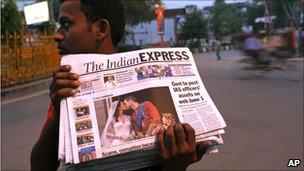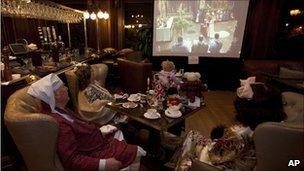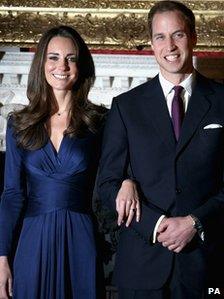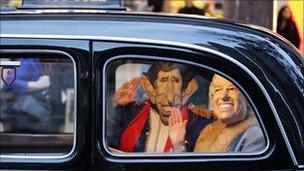Commonwealth: Continents apart but a royal wedding in common
- Published
Hundreds of millions of people are said to have watched the marriage of Prince William and the newly anointed Duchess of Cambridge. But how did it go down in those Commonwealth countries?
With huge crowds lining the streets of London, and street parties across the UK, there was little doubt that much of the British public wanted to celebrate royal wedding day.
And with American news presenters swamping the streets around Westminster Abbey in the run up to the occasion, it came as little surprise to fine out the wedding was avidly watched in the US too.
But the British monarchy's influence stretches around the world. Prince William's grandmother is head of state of 16 Commonwealth countries.
So, were they watching as keenly as the British and Americans? Four correspondents from four very different corners of the world found out.
INDIA, by Soutik Biswas
India's mixed response to the royal wedding was not surprising. Until about midday on Friday, most Indians appeared not be interested in the wedding. But as the day wore on and the news channels beamed wall-to-wall coverage, some - mostly homemakers glued to their TV sets on a working day afternoon - warmed to the occasion.

Anyone interested: India's enthusiasm was late in coming
Big - and wasteful - weddings have a constituency in India. The big-wedding film is a Bollywood staple.
Some of the Indian papers put the ceremony on their front pages on Saturday morning, with the popular picture of the royal kiss variously described as a "liplock" or a moment in which the "lips don't lie".
The mass circulation Times of India offered a considered take in its front-page headline: "A much needed-kiss of life in times of recession." It described the wedding as one of "carefully austere pomp" and even drew parallels between the event and Princess Elizabeth's wedding in 1947 after Britain had lost India.
"And the couple puckered up not once but twice on the Palace balcony, underlining the belief that in a time of economic doom and increasing geopolitical irrelevance, a wedding and the meeting of lips may be the kiss of life," the paper signed off with a flourish.
One top news TV anchor had a piece of advice to the royals. "Next time," he tweeted, "the British royals should outsource the wedding to us. They could do with a little bit of song and dance."
CANADA, by Lee Carter
The time difference being what it was, many Canadians watched the pageantry from London in their pyjamas, although some brave souls still ventured out to public events and private get-togethers.

Small hours: On the west coast the ceremony started at 3am
On the west coast, the most time zone-challenged region of the country, hundreds of hardy enthusiasts put the British back into British Columbia by heading out to the posh Empress Hotel in the provincial capital Victoria, a city long associated with all things royal, to collectively enjoy the TV coverage.
But in the true spirit of Canadian egalitarianism, the style ranged from posh frocks and a sea of bobbing fascinators, to pink pyjamas and fuzzy slippers.
Similarly good-natured events were held at hotels, pubs and residences across the country. Royal revellers at an event in Edmonton were treated to a police pipe band and opera singers belting out both the Canadian and British national anthems. By contrast, the Duke of Kent pub in Toronto managed to lure in the bleary-eyed with merely the promise of a slap-up breakfast and the confident assertion that it was "as close as you can get without buying them a gift".
Others threw private or workplace bashes, often with the slightly irreverent atmosphere of an Oscar party.
Canadian Prime Minister Stephen Harper was among those viewing the event perched on a sofa in front of the telly, instead of from inside Westminster Abbey. He found himself having to turn down the planet's most sought-after invitation, to continue the more plodding task of campaigning in the country's election, with the vote just days away on Monday 2 May.
But the gushing media coverage may not have been an entirely accurate gauge of Canadian enthusiasm for the proceedings. Some surveys have suggested that there was more interest in the final days of the federal election than seeing William and Kate tying the knot.
KENYA, by Kevin Mwachiro

The couple became engaged while on holiday in Kenya
Local TV stations in the country disrupted regular programming to broadcast the wedding between Prince William and the Duchess of Cambridge.
The fact that William became engaged to the then Kate Middleton here in Kenya, seven months ago, was not lost on Kenyans. This was a fact that came up many times when Kenyans were asked about the significance of this wedding.
It didn't stop there. A trip down memory lane to 1952 was quickly mentioned, when Princess Elizabeth who was visiting the country then, was informed of her father's death. This is the country where she became Queen.
Fast forward almost 60 years and Kenyans were keen to witness the wedding ceremony of another royal couple who will remember Kenya for playing a part in ushering them into the global limelight.
Kenya has a tiny but dedicated share of royal watchers and Friday was a day for them to come out of the closest.
Tourism officials had also milked the publicity that the engagement, and thus the marriage, has brought on Kenya. It was no coincidence that the first TV advert during a number of commercial breaks on the local channel was one selling the country as a destination for that romantic safari, where dreams can come true.
AUSTRALIA, by Nick Bryant
This is not a country that tends to stand on ceremony, and for many the royal wedding became an excuse for an irreverent night in the pub spent watching it all unfold on television - television coverage that on one network featured ribald commentary from Dame Edna Everage.

An irreverent take: Australians combined celebrations with normal Friday night fun
The fact that all but one of the networks screened the wedding is also worthy of note. Friday night is footy night, and the rugby league or Aussie rules is normally sacrosanct.
At the bar that I started out in, in Sydney, which was decorated with Union flags and portraits of the royal couple, a bride hurled bouquets of flowers into the air, and the women that caught them were rewarded with free glasses of champagne. Monarchists, republicans and celebrity-watchers all joined in the fun.
However, not everyone was watching. Many didn't give two hoots.
But the Australian hoopla surrounding the wedding served as a reminder that for all the ethnic and demographic changes that have overtaken this country over the past 50 years, along with its reorientation towards Asia, the historical and sentimental link with Britain remains one of the single biggest keys to understanding modern-day Australia.